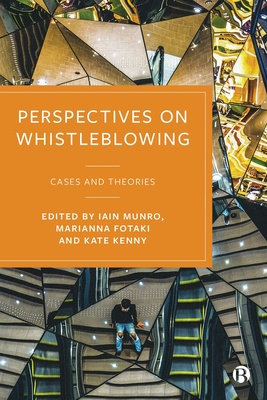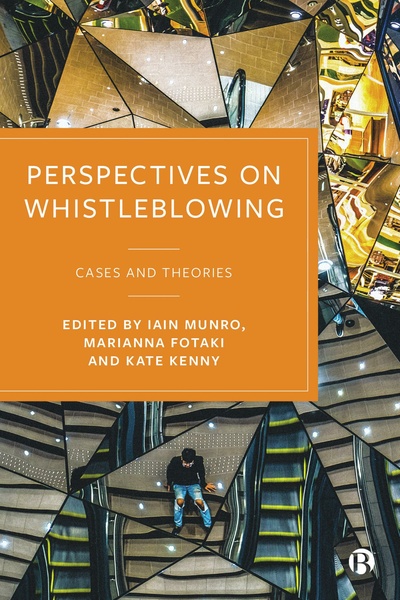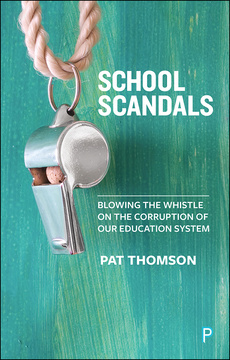Perspectives on Whistleblowing
Cases and Theories
Edited by Iain Munro, Marianna Fotaki and Kate Kenny
Published
Jul 24, 2025Page count
176 pagesISBN
978-1529216929Imprint
Bristol University PressPublished
Jul 24, 2025Page count
176 pagesISBN
978-1529216912Dimensions
234 x 156 mmImprint
Bristol University PressPublished
Jul 24, 2025Page count
176 pagesISBN
978-1529216936Imprint
Bristol University PressSociety acknowledges whistleblowers as truth-tellers who bring urgent concerns to the public’s attention, but at the same time they are subjected to a host of retaliations including smear campaigns, unemployment, prison and exile.
Investigating high profile case studies including Kiriakou, Snowden, Foxley and Assange, this book discusses recent transformations in whistleblowing practice.
With first-person accounts by prominent whistleblowers, it explores the ethical and political dynamics of whistleblowing, use of new technologies in the practice and formal channels for whistleblower protections and legal reforms.
Written by professionals and activists who support whistleblowers, this will be an invaluable resource for researchers working in the field as well as journalists, practitioners and legal professionals.
“Everyone knows that business and government does things they would rather hide from us. That's why it is so important to encourage and protect people who expose their dirty secrets. This is a book about power and its need for secrecy. It important for all of us because it explains both why it is often so hard for employees and citizens to tell the truth, as well as why it is so important that people do. Read it, then decide who you want to blow the whistle on.” Martin Parker, University of Bristol
“This book is an important contribution to the existing literature and a powerful testament to the courage of whistleblowers and their indispensable role in challenging unchecked power, and in safeguarding transparency and democratic accountability. This is due to the multidimensional character of the book: it includes first hand visceral, lived experiences from heroic persons who blew the whistle about the use of torture, the official mishandling of truth, informing the public of systemic corruption arising from concentrations of state and corporate power. Moreover, it advances and complements existing scholarship, by exposing worrying trends in the nexus between state and corporate power, the retaliation against whistleblowers and their supporters and the related legal loopholes and the overall contribution of whistleblowers to the right of resistance and democratic invigoration. Highly recommended for anyone who values truth, justice, and the defence of democratic principles. Above all is a call to Action. The Romans reminded us that jura sunt vigilantibus scripta, the rights exist only if we are vigilant for their protection. Or, better said in the words of one of the authors, a famous whistleblower: We all have to fight!” George Katrougalos, Democritus University of Thrace, UN Independent Expert on international order and former foreign minister of Greece
“This is a compelling story - we need more books like this. The authors Iain Munro, Kate Kenny, Deepa Driver, Marianna Fotaki, Craig Murray, John Kiriakou, Ian Foxley, Andrew Fowler and Robert Tibbo are experts from different national contexts who speak truth to power. They show us why whistleblowers are essential in a democratic society, how government secrecy has been a facilitator of war crimes and crimes against humanity, how secrecy in the private sector enables blackmail, corruption, tax evasion, how the media is complicit by engaging in disinformation and defamation of whistleblowers, why we must counter the “dominant norms of silence“ about the “organizational wrongdoing“ around us. Civil society demands transparency and accountability in all sectors and an end to the prevailing culture of impunity. Indeed, we have a right to know what governments do in our name, what corporations do behind our backs. As true human rights defenders, whistleblowers themselves deserve protection from mobbing, persecution, arbitrary detention and torture. An international Charter of Rights of Whistleblowers should be adopted by the UN, which already recognizes the right to truth, entailing the right to access information stipulated in article 19 of the International Covenant on Civil and Political Rights. Courageous persons like Julian Assange and Edward Snowden are heroes of our time who truly merit the Nobel Peace Prize.” Alfred de Zayas, Geneva School of Diplomacy and former UN Independent Expert on international order
"New Perspectives in Whistleblowing offers up a vital narrative that goes beyond the theoretical, spotlighting the visceral realities of whistleblowing. The book intertwines poignant first-person accounts with incisive academic analysis, shedding light on the courage and sacrifices demanded of those who dare to speak truth to power. For me, the book resonates deeply with my own experiences working alongside whistleblowers like Julian Assange on the Iraq War Logs. I’ve seen firsthand the extraordinary courage it takes to expose systemic wrongdoing- and the devastating consequences whistleblowers often endure. The accounts within this book echo that reality: imprisonment, financial ruin, defamation, and, most heartbreakingly, isolation. They remind us that the act of whistleblowing is not just a moment of bravery but an ongoing struggle for integrity against systems designed to suppress it. The editors succeed in capturing the dual nature of whistleblowing: as both a mechanism of democratic oversight and a perilous act of civil disobedience. This duality is evident in the book’s exploration of whistleblowing as a form of resistance, challenging not only institutional corruption but also the broader societal apathy that allows such corruption to thrive. What makes this book stand out is its unflinching critique of the media and legal frameworks that fail whistleblowers. Having worked with Assange during his rise and subsequent vilification, I found the book’s arguments about the media’s complicity in undermining whistleblowers strikingly accurate. Just as Assange became a caricature in the press, overshadowing the human rights abuses his leaks exposed, the narratives in New Perspectives in Whistleblowing reveal how often the messenger is punished, and the message buried. For anyone committed to justice, transparency, and the safeguarding of democratic ideals, this book is essential reading." Iain Overton, Action on Armed Violence
"In this age of intensified concentration of state and corporate power and assaults on democracy, how Whistleblowers can disclose and survive is an urgent question. This excellent and necessary book addresses that question by drawing lessons from the visceral experiences of the Whistleblowers themselves, exploring what forms of alternative organisations and solidarities they need." Alan Bradshaw, Royal Holloway University of London
"A superb collection that not only surveys the latest developments in whistleblower research but also gives voice to whistleblowers and the support networks around them. In bringing together theory and lived experiences, the book is an important contribution to an ongoing debate around why the fates of those who speak out about wrongdoing and democratic accountability are intertwined." Kaeten Mistry, co-author of Whistleblowing Nation: The History of National Security Disclosures and the Cult of State Secrecy
Iain Munro is Professor of Management at Newcastle University.
Marianna Fotaki is Professor of Business Ethics at the University of Warwick Business School.
Kate Kenny is Professor of Business and Society at National University of Ireland, Galway.
Part 1: New Perspectives on Whistleblowing
1. Introduction: New Perspectives on Whistleblowing - Iain Munro, Marianna Fotaki and Kate Kenny
2. Whistleblowing Research: Recent Developments - Iain Munro, Marianna Fotaki and Kate Kenny
Part 2: The Whistleblowers
3."Why We All Have to Fight”: An Insider Speaks Out on the Crimes of the CIA - John Kiriakou
4. A British Ambassador on the UK’s Involvement in Torture and Human Rights Violations - Craig Murray
5. Reflections of the Man in the Mirror - Ian Foxley
6. Whistleblowers as Supporters and Researcher-Academics - Ian Foxley
Part 3: Whistleblower Support Networks
7. Journalism, Whistleblowing and National Security: The WikiLeaks Case - Andrew Fowler
8. The Crisis in Human Rights: Protection of Whistleblowers and Refugees - Robert Tibbo
9. Silencing Whistleblowers and Their Allies: The Torture of Julian Assange - Deepa Driver
10. Discussion and Conclusions - Iain Munro, Marianna Fotaki and Kate Kenny










